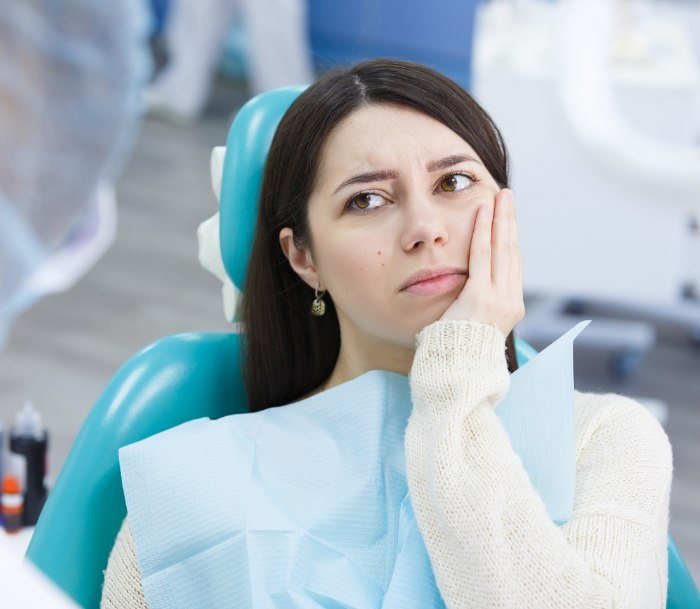Emergency Dentist – Jersey City, NJ
Timely Endodontic Treatment in Urgent Situations

You can’t afford to ignore an infected or cracked tooth for very long; the problem will only grow more severe if you don’t have it treated by an expert as promptly as possible. Do you have an oral health emergency that you think might require a root canal? If so, please call North Jersey Endodontic Group of Jersey City right away. We offer same-day appointments for dental emergencies, so you won’t have to wait too long to find relief from tooth pain.
Why Choose North Jersey Endodontic Group of Jersey City for Emergency Dentistry?
- Same-Day Visits for Emergency Patients
- Team That Cares About Comfort
- Modern Practice with Cutting-Edge Technology
What Types of Dental Emergencies Can an Endodontist Treat?
When you think a root canal may be needed to resolve your dental emergency, calling an endodontist is likely your best bet. We urge you to reach out to our dental office immediately if your emergency involves any of the following:
- A cracked or otherwise damaged tooth that may be vulnerable to infection.
- Sensitivity in a specific tooth whenever you consume particularly hot or cold foods and beverages.
- Pain in the tooth that occurs whenever you use it for biting or chewing.
How We Treat Dental Emergencies

Upon receiving your call, we will ask about your symptoms and gather as much information as we can about your situation. We’ll give you first-aid instructions for managing the issue at home, and we’ll make time to see you as soon as we can. During your emergency dentistry appointment, we’ll examine the tooth carefully and figure out whether root canal therapy might be required. The next step is to work with you to create a treatment plan; once we have agreed on the next steps to take, we can move forward with the process of saving your smile.
Understanding the Cost of Emergency Dentistry

What kind of dental issue are you suffering from? How severe is it? What kind of treatment do you need? The answers to these questions will help determine the overall price of your emergency endodontic care. Don’t worry; you won’t have to move forward with any procedures before you have an idea of how much you will need to pay for them. On top of that, our team is willing to work with you to help make your treatment as affordable as possible.
Every Dental Emergency is Different

Treating some dental emergencies is more complicated than treating others. While you can usually expect to pay more to treat a dental emergency than you would for a standard exam and cleaning, there is no one-size-fits-all answer for the exact price. There are several factors that can contribute to the total cost of treatment such as how much restorative work is needed. Our team will make every effort to ensure that you understand the treatment you need and how much you can expect to pay before treatment begins.
Does Dental Insurance Cover Dental Emergencies?

The specifics of what insurance will pay for vary from one dental plan to the next, but diagnostic care is usually covered. Dental plans generally cover 50% of major restorative procedures like root canals, which can lower your out-of-pocket cost considerably. If you’re not sure what your plan covers, we will be more than happy to go over the details with you and do what we can to make sure that you receive the most out of your benefits.
Taking Care of Your Smile Can Save You Money

The best way to deal with a dental emergency is to prevent it from happening in the first place, and oral hygiene supplies and routine dental appointments are all much less expensive than a root canal. Practicing excellent oral hygiene every day while seeing your dentist regularly is the best way to prevent the decay that makes a root canal necessary.
If you play contact sports or enjoy activities like riding your bike, wearing a mouthguard can prevent injuries that may require endodontic therapy. Avoid chewing on non-food items like paperclips, ice, or erasers out of nervousness or boredom, as these activities can injure teeth and make them vulnerable to infection. If you grind your teeth when awake, being aware of the habit can help you break it. If you grind your teeth in your sleep, wearing a mouthguard to bed is the best way to prevent dental damage.
Dental Emergency FAQs
Our Jersey City endodontic team is always ready to help patients find relief from the pain of dental emergencies. Before you call us, though, you might want to know more about urgent oral health situations and how to address them. Below, you will find answers to some common questions. If your specific questions are not included here, get in touch with our team. We will be happy to assist you!
Will My Toothache Go Away on Its Own?
Teeth cannot heal themselves, so it is very unlikely that your toothache will go away on its own. If it does go away, it might mean that the pain was not coming from the tooth itself; it might have been coming from a nearby structure, such as your gums.
Another reason why a toothache might suddenly disappear is if the nerve inside it dies. Once that nerve is no longer functioning, it cannot send pain signals to the brain. However, the infection that caused the original toothache could still be present. It can spread into nearby tissues and threaten your overall health! It would be best to seek treatment long before that happens.
How Should I Sleep with Tooth Pain?
Toothaches can seem to get worse at night! To reduce your discomfort and get the sleep you need, try these tips:
- Keep your head elevated in order to prevent too much blood from rushing to the area around your aching tooth.
- Take over-the-counter pain medications to reduce pain.
- Do not eat any hard, acidic, hot, or cold foods before bed. If you are hungry, eat a mild, soft snack.
- Apply a cold compress to the side of your face to reduce pain and inflammation. (Do not fall asleep with ice on your face or gums. Overexposure to cold can cause tissue damage!)
What Does Throbbing Tooth Pain Mean?
Throbbing tooth pain usually points to an infection in the tooth, which can cause inflammation and make the tooth’s nerve send powerful pain signals to the brain. This situation often indicates the need for root canal therapy, so it certainly merits a call to our emergency dental office.
If the throbbing pain is not in a single tooth but in several teeth, it might be the result of teeth grinding and clenching. Your general dentist may be the best person to assist you.
Should I Visit the Emergency Room First for Dental Emergencies?
Hospital emergency rooms do not usually have people who are well-versed in how to handle dental emergencies. They might be able to do nothing other than provide pain medication and tell you to visit a dental professional.
Of course, there are a few situations in which you should make the emergency room your first stop. For example, if you have an infected tooth that has led to a high fever or breathing problems, you should go to the hospital. Later, you can receive care from a qualified dental team.
Root Canal Therapy Endodontic Retreatment Cracked Tooth Treatment Apicoectomies & Endodontic Microsurgery Lightening Discolored Teeth View Our Services
